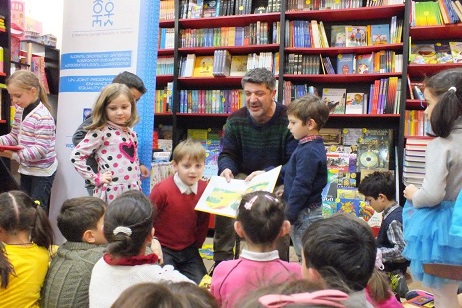New campaign in Georgia: Father, read me a book!

Georgia is embracing a new campaign to encourage fathers to be more involved in raising their children.
Father, read me a book! is the name of the United Nations-organised campaign, which launched throughout Georgia this year.
The project aimed to spread the message to parents, especially young parents, to fully participate in family life and inspire fathers to spend more time with their children. By developing stronger family relations, parents can help their children cope with everyday tasks and overcome new challenges.
The United Nations Population Fund, who was behind the campaign, said one of the main messages of the project was to encourage fathers’ to spend more time with their children and read them books.
A group of famous Georgian fathers have embraced the campaign to show how they spend time with their children and promote fathers’ active role in family life.
The men, who are famous local painters, writers, musicians and more, filmed short videos of themselves explaining how they cared for their loved ones, activities they enjoyed and outings they experienced.
Looking ahead, the men will spend the next few weekends in local bookshops reading to children and their fathers, and explaining that looking after children is not only a women’s role. After this, the men will venture out to Georgia’s regional areas and read to children and fathers who live in the rural community.
Last year the United Nations Population Fund conducted a survey named ‘Men and gender relations in Georgia’ which highlighted that in traditional Georgian families, it was the women’s job to raise children.
The survey showed that only 11 percent of interviewed fathers believed it was important for males to be involved in their children’s upbringing. This small group of male respondents said they shared the parental duties, such as feeding, babysitting, and walking daily with their child.
Conversely, 70 percent of men surveyed believed it was a women’s role to look after the children, keep the house in order and cook food for the family, while it was a man’s job to financially support the family. Despite this, men believed there was gender equality in Georgia.
 Tweet
Tweet  Share
Share